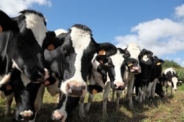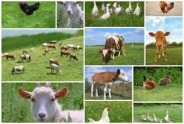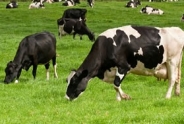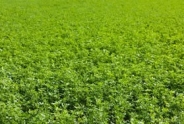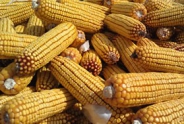Animal Care in Summer Weather
Libby Eiholzer, Bilingual Dairy
Northwest New York Dairy, Livestock & Field Crops
September 15, 2014
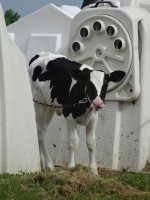
Share this article with your employees so that everyone can help keeps cows and calves comfortable and healthy this summer!
The hot summer months can do a lot worse than make workers irritable and uncomfortable. Heat negatively affects cow performance in many ways. It can reduce fertility as well as decrease feed intake and milk production. Dairy cows can begin to feel mild heat stress when temperatures reach only 65 degrees, but relative humidity also plays a role. When humidity is higher, cows begin to experience heat stress at a lower temperature. Signs of heat stress include increased respiration and rectal temperature, panting, foaming at the mouth and bunching.
What can you do?
Make sure the cows have enough water. Keep waterers clean and full of fresh water so that cows are encouraged to drink more.
Keep an eye on cow cooling devices? fans and sprinklers should be in good working condition in order to maximize cow cooling.
Keep stalls bedded and clean to entice cows to lie down and not bunch in the allies.
Try to leave cows alone during the hottest times of the day. If possible, complete herd work in the early morning when it is still cool.
Extra precautions need to be taken with calves as well.
Chill colostrum quickly using an ice bath or bottles of ice in the colostrum, then refrigerate or freeze. Hot weather allows pathogens to reproduce quickly, so even a short time at room temperature can drastically reduce colostrum quality.
Monitor grain pails closely and replace grain before it becomes soggy, moldy, or otherwise undesirable to calves. The fats in calf grains can go bad very quickly when it?s hot, leading to a rancid smell that turns calves off from it.
Calves, too, need to have fresh water provided at all times. Scouring calves or calves off feed should receive electrolytes to prevent dehydration.
Don?t skimp on cleanliness! Bedding should be kept fresh and dry to control flies. Rinse and wash feeding equipment that comes into contact with milk in order to prevent the buildup of biofilms- and bacteria.
For more information on calf care during summer months, visit the Calf Facts & Calving Ease pages at www.atticacows.com.
Upcoming Events
2026 Forage Congress
January 28, 2026
Nunda, NY
Register to attend 2026 Forage Congress!
2026 NWNY Dairy Day
February 5, 2026 : NWNY Dairy Day 2026
Perry, NY
Sponsorship and Registration OPEN!
The CCE NWNY Dairy, Livestock and Field Crops team will be holding it's 4th Annual "Dairy Day" on February 5, 2026! We will be bringing the latest in dairy research and hot topics to you with this in-person, 1-day conference.
2026 Soybean & Small Grains Congress
February 11, 2026
Henrietta, NY
Participant Registration for the 2026 Soybean & Small Grains Congress NOW OPEN!
Announcements
Follow us on Instagram
See photos and reels of our most recent events and programs!Join us on Facebook!
Follow us on Facebook to get up to date posts about events, workshops and everything NWNY!Add us on LinkedIn!
Connect with us on LinkedIn to get more information about upcoming workshops and programs!

